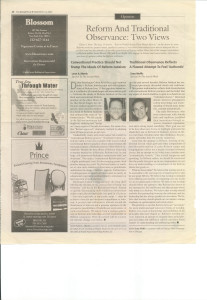Editor’s Note: The Aug. 10 article, “Reform Youth Flexing Their Ritual Muscle,” on the desire by some Reform youth for greater ritual, sparked a variety of reactions from readers as to how to interpret this reported trend and the attitudes of an older generation of Reform rabbis. Here, two of the younger generation of Reform rabbis, Leon Morris (38) and Evan (29) engage in debate and conversation, reflecting a spectrum of opinion within the Reform rabbinate.
Conventional Practice Should Not Trump The Ideals Of Reform Judaism
Leon A. Morris, The Jewish Week
Debra Nussbaum Cohen describes a gap between today’s Reform Jewish youth and older generations of Reform Jews. If that gap does indeed exist, it is reflective of a much larger and more serious gulf between the ideals of Reform Judaism on the one’ hand and conventional Reform practice on the other. Many of _us, like David Singer, the rabbinical student quoted in the article, sted to believe in a kind of Reform Judaism that embraced the value of “informed choice.” We did exactly as the Reform movement had taught us, studying and “trying on” many aspects of Jewish observance. For some of us. this “Reform approach” ultimately resulted in adopting most of these practices as our own.
Undoubtedly, many such observances run counter to “conventional Reform practice.” Nussbaum Cohen’s article provided at least one example of the ways in which conventional Reform practice almost always trumps the ideological ideals of Reform Judaism within Reform institutions. Despite the best efforts of Reform leadership to market themselves differently, Reform laity, by and large, still understands Reform as synonymous with “not observant.” This makes “conventional Reform practice” a highly problematic basis for discouraging greater ritual practice among our youth. For Reform leaders or teachers to view more traditional observance as problematic undermines the ideals of Reform Judaism. Furthermore, it is disingenuous to regard such observance as merely an educational experiment predetermined to culminate in a later rejection of such practices.
Nussbaum Cohen’s story captures the long shelf life that the old turn-of-the century fear of being “too Orthodox” still has in the Reform movement. Instead of quietly discouraging more traditional observance either explicitly or implicitly, our goal in all places but most especially at our youth camps must be to foster a love for and deepened commitment to Judaism. A positive and enthusiastic attitude toward the observance of mitzvot and a genuine openness to the persuasive possibilities of halacha are expressions of such commitments. We mustn’t fear a younger generation of Reform Jews Who may not feel comfortable in Reform synagogues. Their discomfort will be a source for renewal, change and reform.
Traditional Observance Reflects A Flawed Attempt To Feel ‘Authentic’
Evan Moffic
In the past several decades, Reform Judaism has embraced previously discarded rituals and traditions. This greater traditionalism reflects both dissatisfaction with conventional Reform practices and the belief that any aspect of Jewish tradition is open to us based on our “informed choice.” Informed choice, however, presupposes a deep knowledge and understanding of Jewish texts, histories, customs and practices.
The early Reformers, who were conversant with Jewish laws and tradition. justified their innovations through responsa, reasoned argumentation and a strong moral sensibility. Their goal was not to be less observant. It was to highlight and teach the ideals they saw at the heart of Judaism: a focus on ethics over ritual, freedom rather than obedience, the prophetic call rather than the priestly injunction.
I fear that the upsurge in Hebrew, donning of traditional Jewish ritual garb and other components of Jewish traditionalism in some Reform camps and congregations reflect not a deeply reasoned informed choice, but an attempt to feel what some consider more “authentically Jewish.” This is both dangerous and upsetting. As Reform rabbis, we should be concerned that the youth who grew up in our congregations do not have an understanding or commitment to the Reform ideals that guide us.
What are these ideals? We believe that worship needs to be accessible to the vast majority of American Jews who do not speak Hebrew. We believe that worship is intended to be edifying and sensible, not requiring us to say words we do not understand or believe. We believe that worship should reflect the openness that Reform has shown to the intermarried, the unaffiliated and other groups whose only home is in Reform. We believe that worship should embody that partnership between the rabbinate and lay leadership that has always guided our movement. We believe that worship should uphold our movement’s unique emphasis on egalitarianism and social justice.
The problem is not that Reform Jews are “not ready” for more traditional and innovative forms of worship. Rather, it is a lack of knowledge and confidence in the principles that have shaped us. Reform’s worship services represent an attempt to integrate these principles, and our camps and rabbinical schools can assist future leaders in understanding and embracing them.

